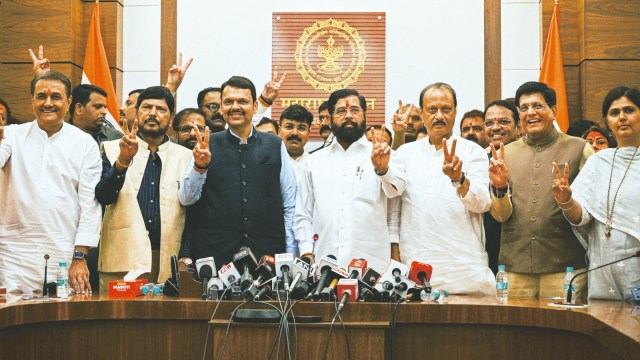
Maharashtra’s organic political profile has undergone a complete makeover since the formation of the two multi-party political blocs: Maha Vikas Aghadi and the Mahayuti. The two coalitions have made the political landscape of the state ideologically horizontal.
After 100 days of the Mahayuti government, the report card shows that of the 48 ministries, only 12 achieved 100 per cent of their target, while 18 ministries achieved 80 per cent. Though this means the overall performance is well above average, the lack of internal coordination among the ministries has become public. The latest issue is the tussle between the Shiv Sena and the NCP — the two BJP allies — over the Mukhyamantri Ladki Bahin Yojana, which is believed to have played a significant role in the Mahayuti’s thumping victory in November 2024.
The internal arrangements of the governing coalition have been falling apart at regular intervals. The issues, ranging from the seniority of the two Deputy Chief Ministers, the movement of files and the allocation of resources, to the position of guardian ministers, have erupted without any definitive solution. As the guardian minister is the Chairperson of the District Planning Committee, stop-gap arrangements would mean decisional inertia at the district level.
Besides, though the Mahayuti government claims to be meeting its infrastructural and social development targets, the fact remains that the government faces serious budget deficits. This is mostly due to the Ladki Bahin Yojana. Much of the treasury seems to have been taken away by the popular scheme targeting women under the Rs. 2.5 lakh income bracket.
The scheme has been facing issues since its inception. The individual parties in the Mahayuti are using it for their own political advantage, instead of having a holistic operational approach as a coalition. During Eknath Shinde’s tenure, there were allegations that the NCP deliberately did not use the full name of the scheme, which features the prefix “mukhyamantri”. The hurriedly put together list of beneficiaries is also an issue that the scheme faces till this day.
It is due to this scheme that financial prudence and the depleting resources of the state have remained major points of concern. The Mahayuti government had to climb down from its earlier effort of doling out the benefits to the unverified registered beneficiaries. Strict adherence to the eligibility criterion was a welcome austerity measure to save the scheme. However, the promise of increasing the amount from Rs. 1,500 to Rs. 2,100 per month could not be met even after four months. While the Mahayuti government has not said that the amount will not be increased, it has been unable to give an exact timeline.
The matter was further complicated as the Minister for Social Justice and Shiv Sena leader Sanjay Shirsat, alleged that his ministry only received Rs 22,658 crore out of the allocation of Rs 29,500 crore. He also alleged that approximately Rs 400 crore was reallocated to fund the Ladki Bahin scheme without his knowledge. The minister’s open criticism of the finance ministry’s decision — led by NCP leader and deputy CM Ajit Pawar — to reallocate funds from the social justice department, shows the cracks within the coalition. It also indicates the finance ministry’s apathy towards the marginalised communities of the state.
In 2024, students belonging to the Scheduled Caste (SC) had staged a dharna against the non-issuance of the state scholarships which are disbursed from the social justice department. The students who had availed the overseas scholarship for the SCs and STs this year are left in the lurch as the uncertainty of the scholarships in foreign countries looms over them for the last two months. The students have reportedly complained of starvation and eviction from rented accommodations.
Moreover, there has been a prevalent practice of reallocating funds from the social justice department to sustain other schemes. However, mostly it is done after December. But if within two months of the budget being announced, a substantial amount meant for the development of the marginalised is reallocated, it is a matter of serious concern.
The expenditure on social infrastructure, like health, education, housing, and civic utilities, has to be balanced with that of investment in the social justice department. And for this to happen, the ruling Mahayuti coalition must behave like a coalition, not as a collection of fragments.
The writer is a professor at the University of Mumbai